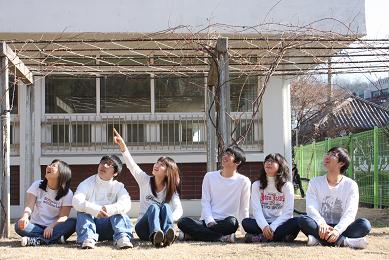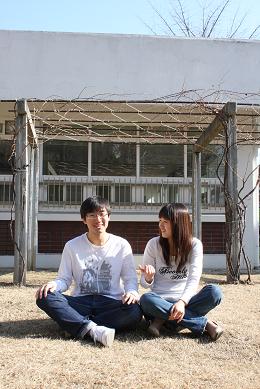Yonseians’ views and experiences of sex

THE FIRST thing that comes to your mind when you think of sex might be a scene of sexual intercourse. Mainstream media, the Internet, and print publications have focused on only one aspect of sex - sexual intercourse - exposing people to provocative and sensual depictions of sensual depictions of sex. This aspect of the media seems to be a reflection of modern sexual culture, which emphasizes the physical too much whilst disregarding the other aspects of sex. To look into Yonseian’ sexual culture and to understand how young people are influenced by this sensual concept of sex, The Yonsei Annals surveyed 1,031 Yonsians who might have been exposed to today’s sexual culture. By analyzing the attitudes of Yonseians, we shall try to find out what are the real views of sex.
Students’ conceptions about sex
Confucianism was adopted as a national philosophy during the Joseon Dynasty. Confucianism has influenced many spheres of culture, including sex, in Korea. Regarding sexual culture, Confucianism generated a repressive atmosphere. It viewed pursuing sexual desires as taboo and saw sex as a dirty thing. That atmosphere especially repressed women’s sexual desires and pressured women not to have intercourse before marriage. As 23.76% of respondents replied, the overall social tradition or culture has influenced them most in forming their ideas about sex. It seems that many students have constructed their conception of sex based on this repressive atmosphere. It can be assumed that they are familiar with words such as taboo or virginal purity.
The prevalence of sexualized images in today’s Korean society might be the legacy of this repressive atmosphere towards sex in traditional society. The young usually want to know essential aspects of sex. However, the sexual atmosphere inherited from the past can not teach them properly or satisfy their curiosity. Consequently, the young become dependent on information from the media or the Internet rather than education by parents or schools. This tendency is also found in our survey results, in that mass media formed 18.82% of respondents’ answers. Koo Sung-ae (Director of Purun Ausung (sex advice office)) says that adults are responsible for students’ dependence on information from the media. “Adults do not usually teach what the young really want to know. Adults only tell them that sex should be concealed and seen critically. Thus, students get sick of these talks. This has made students reject advice from adults, and instead they became dependent on sexual images shown in the media or on the Internet,” says Koo. However, sexual contents in the media cannot lead the students in the right direction. At first glance, sexual contents seem helpful for students to be open-minded and to see various aspects of sex. However, sexual contents in the media have only influenced students to accept a distorted image of sex as pursuit only of sensual pleasure. Today’s active discussions about sex are good, but a more serious approach should be taken in order to understand sex properly.
 |
Box 1: Intercourse before marriage
In Confucian society, it was mandated to maintain virginal purity before marriage. Under the influence of Confucianism, premarital virginity is still regarded as important in Korea. A new definition of purity has appeared lately, however. Koo says, “Previously, purity was the idea of an intact hymen.” She insists that this idea is a kind of anachronism. “The word purity should have the meaning of being pure-hearted, not preserving chastity. Purity is keeping faith between lovers. Keeping purity of mind is more important than losing virginal purity. If you understand why you want to have sex and know clearly who your sexual partner will be and when to have sex, losing your virginity should never be a problem,” says Koo. Many students appear to appreciate her opinion. A majority of respondents were not under pressure to remain virgins. They do not seem to regard premarital virginity seriously.
Yet, when we examine the results of both genders separately, there is a gap between male and female students. The percentage of female students experiencing the burden of remaining virgins was relatively higher than males. Maybe the imperative idea from Confucianism is still applied to women.
On the question asking about a future marriage partner’s virginity, it turned out that students want their future marriage partner to be pure more than they feel the pressure to be themselves. Students may think virginity is not really important in general, but when it comes to their relationships, they are likely to value it more highly.
How much pressure do you feel to remain a virgin until you marry?
A lot (7.47%)
A little (16.10%)
So-so (19.30%)
Not much (29.97%)
Not at all (26.09%)
No comment (1.07%)
Feel pressure
Male (14.63%)
Female (37.46%)
Do you want your marriage partner to remain a virgin until you marry?
A lot (11.64%)
A little (20.37%)
So-so (28.71%)
Not much (20.66%)
Not at all (14.35%)
Don't know (2.81%)
No comment (1.45%)
Students’ thoughts on sexual identity and sexual minorities

Concern about sexual identity is one of various worries that students can have regarding sex. It turned out that a total of 6.60% of respondents worry about their sexual identity. In the past, sexual identity and biological identity were regarded as almost the same thing. These days, however, sexual identity is regarded as different from biological identity. There are some people who feel that they are opposite to or different from their physical characteristics. Sometimes people look for clear answers to their own sexual identity. Yet, the media do not provide as clear answers as people want. Images of gender in the media are fixed and discussions about sexual identities are not adequate. However, the issue of sexual identity should not be ignored anymore, as the number of sexual minorities is growing. According to the survey, it turned out that 9.41% of the respondents are not heterosexuals. This shows that the proportion of sexual minorities in society is not negligible. Min Kyu-dong (Movie director of “Soo”), who is a director of Antique, says that the desires of present sexual minorities may be regarded as natural in the future. “Fixed ideas in society always change and there is no perfect value to be kept. Maybe, in the future, people will look back at our society where sexual minorities were strange and regarded as unnatural. Defining sexual identity will be an old tradition.”
Recently, there have been several attempts to see gender from a different angle. The contemporary mass media try to show stories of sexual minorities. That new move in the media may have influenced the public to think of sexual minorities more positively. It turned out that about half of respondents support the legalization of homosexuals’ marriage. However, students appear inconsistent in their attitudes towards sexual minorities. This might be because people are only familiar with fictional depictions in the mass media rather than the reality. Mostly, sexual minorities in fiction do not reflect reality and actual social circumstances. Homosexuality movies or dramas usually pursue romanticism and they are not serious. They just end up satisfying the stereotypes of the public, who expect something unique from sexual minorities. However, people’s illusions about homosexuality are not applied to reality in general. On the question asking for views on homosexuality, 40.54% replied that they do not think of it negatively but they feel a little uncomfortable with it. This result reflects how students perceive homosexuality in the real world.
Students’ concerns about sex 
There was a question asking what kind of worries students have about sex. It turned out that about 36.08% of the respondents worry about their sexual attractiveness or sexual ability. A total of 24.83% worry about physical interaction with their partner. Those students’ main concerns regarding sex show one important aspect of sex as a human relationship. Sex can be compared to a bond and interaction among people. Sexual attractiveness helps you make a good impression when you meet others at first, and sexual ability and physical interaction are deeply related to a couple’s relationship. Koo says, “Sex plays an important role as a relationship in human society. Sex is not one’s own secret but everyone’s way of interaction with others.”
Another serious worry about sex among students is the possibility of venereal infection or unwanted pregnancy. Careless sexual intercourse can cause venereal diseases or unwanted pregnancy. As most university students are not ready to be mothers or fathers, many of them would consider an abortion if they had a baby before marriage. A total of 41.32% said they would consider abortion. Lee Im-soon (Prof. & obstetrician of Soonchunhyang Univ. Hospital) says, “The young usually do not think about the possibility of unwanted pregnancy when they have intercourse. However, after thoughtless intercourse, they start worrying about it. This makes people choose abortion as a means of contraception even if it could be dangerous.” Lee also explains that abortion can be a cause of habitual miscarriage: “Abortion can cause sterility. It would be terrible if you cannot have a baby when you really want one.” There are some other dangers of medical abortions. Abortion not only ends the life of a baby, but it also causes many kinds of side effects, such as sadness and depression.
Importance of sexual desire
In the past, sexual desire was regarded as not appropriate to have or to express. However, sexual desire is a basic and natural instinct of humans. Koo says, “This is the time to think about a healthy sex life.” The satisfaction of sexual desire can be pleasurable to humans. By satisfying sexual desire properly, people can keep their lives healthy. Yonseians seem to be contented with their sex lives, and they chose masturbation as their best way to satisfy their sexual desire. About half of respondents, 51.60%, understand the benefits of masturbation, but think excessive masturbation is bad. Koo says, “People in their twenties have the most powerful sexual energy in their life. I wish university students would realize the importance of sexual desire.” She explains that masturbation is one of the practical ways to satisfy sexual desires for unmarried people in their twenties: “Proper frequency (once or twice per week) of masturbation is good. Masturbation makes people not only pleased but also relieved from conditions such as sexual frigidity.”
Students’ sexual intercourse experiences
Generally, people think that the age of twenty is the appropriate time for the young first to have intercourse. Reflecting this common belief, a total of 74.10% respondents who have had intercourse said that they had their first sexual experience after the age of twenty. As most university students are in their twenties, they might have had their first sexual experience not long ago. Accordingly, it is natural that they are not mature enough when it comes to sex, so they may make some mistakes when they have intercourse.
One of the mistakes they might make is forcing intercourse on their partners. That happens when one does not respect the other’s opinion. When a partner does not want to have sexual intercourse, his or her opinion should be respected. However, immature people in their twenties can make mistakes by forcing their partner to have sexual intercourse. Though coercive intercourse can seem like a minor problem between one couple, it constitutes obvious violence to a partner. It turned out that 7.59% of respondents have experienced coercive sex. Though the number of respondents who have had coercive intercourse is small, memories of compulsive sex will last for a long time. Thus it is important to understand a partner’s views and respect them. It turned out that Yonseians generally respect their partner’s wishes. A total of 58.10% said they would respect their partner if their partner does not want intercourse. By having more serious conversations, people will be able to understand and respect their partner’s opinion.
Another mistake immature students can make is having accidental intercourse, such as a one-night stand. It is easy for people in their twenties to meet strangers at nightclubs, bars, or on the Internet. Accidental intercourse constitutes only a one-time pleasure for the young. This leads them to have intercourse thoughtlessly. People will have the possibility of catching venereal diseases if they have accidental intercourse carelessly. Also, if you have a boyfriend or a girlfriend, you may lose your lover.
Box 2: Contraceptive medicine & condoms
Taking contraceptive medicines and using condoms might be the most useful and easiest way for the young to prevent pregnancy. These days, people tend to use both methods for perfect contraception because condoms and medicines have their own different advantages. In terms of success rates, contraceptive medicines are more effective than condoms. Medicine’s rate of failure is less than 1%, whilst condoms’ rate of failure is 2% ~ 15%. Condoms are effective in preventing venereal diseases, though. Using both methods is called dual protection.
 |
 |
We have looked at the sexual beliefs and lives of Yonseians. By looking into their experiences and conceptions regarding sex, we can see the general sexual culture of university students. Students’ sexual culture is influenced both by the media and the conservative atmosphere of society. These conditions have formed their thoughts and attitudes toward sex. There seems to be a gap between real worries about sex in their lives and their conceptions of sex. In real life, sex is part of human relationships. In that sense, students need to broaden their ideas about sex. Koo says, “We need to see various aspects of sex related to real life, which includes human relationships.” By sharing opinions about sex, we will be able to know more about sex from an unbiased and balanced viewpoint.
 |
What is the most influential factor on your conception of sex?
Parents (8.05%)
Friends (14.84%)
School education (3.01%)
Mass media (18.82%)
Religion (4.85%)
Social atmosphere/tradition (23.76%)
Others (6.50)
No comment (20.17%)
What do you worry about sex? (Plural responses)
Sexual identity (6.60%)
Sexual attractiveness or sexual ability (36.08%)
Physical interaction with partner (24.83%)
Partner’s rejection of sexual intercourse (8.92%)
Infection of venereal disease or unwanted pregnancy (22.70%)
None (29.39%)
Others (3.20%)
What kind of sexual identity do you have?
Heterosexual (89.62%)
Bisexual (7.76%)
Homosexual (1.65%)
Others (0.19%)
No comment (0.76%)
What do you think about legalization of homosexuals' marriage?
Absolutely agree (12.32%)
Quite strongly agree (36.08%)
Quite strongly disagree (17.36%)
Absolutely disagree (18.33%)
No concern (10.38%)
Don't know (5.14%)
No comment (0.39%)
What do you think of homosexual love?
It does not matter because it is love between lovers (29.68%)
Do not think negatively but feel uncomfortable with it (40.54%)
Think negatively (25.61%)
Don’t know (2.13%)
Others (1.55%)
No comment (0.48%)
Would you consider abortion if you or your partner became pregnant before marriage?
Absolutely (9.31%)
Quite strongly (32.01%)
So-so (16.78%)
Not much (18.23%)
Not at all (11.06%)
Don’t know (10.57%)
No comment (2.04%)
Do you think your sexual desire is being satisfied?
Absolutely (7.86%)
Quite a lot (21.53%)
So-so (39.77%)
Not much (20.85%)
Not at all (4.27%)
Don’t know (4.95%)
No comment (0.78%)
Have you ever had sexual intercourse?
Yes (46.56%)
No (52.38%)
Male-Yes (53.62%), No (46.38%)
Female-Yes (37.22%), No (62.78%)
Have you ever had a one-night stand?
Yes (22.50%)
No (77.50%)

